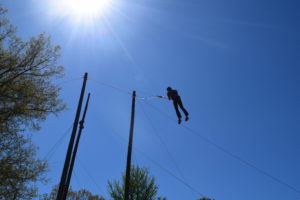 In active addiction it doesn’t matter if you’re drinking and drugging with a few friends or 100 people at a party. Even though you’re not physically alone, addiction is all about isolation. So, it’s no wonder treatment centers like Cumberland Heights put such a strong emphasis on community while in recovery.
In active addiction it doesn’t matter if you’re drinking and drugging with a few friends or 100 people at a party. Even though you’re not physically alone, addiction is all about isolation. So, it’s no wonder treatment centers like Cumberland Heights put such a strong emphasis on community while in recovery.
“I think if you just bring people into treatment and then wish them well out the door, really all that is a band-aid and we need something for long-term engagement,” said Alumni Relations and Volunteer Coordinator Jaime Gibbons.
Jaime has more than 16 years of recovery. She first got sober at Cumberland Heights as a patient in 2003. She remembers when she first left treatment how much she relied on her recovery community to get her through everything life was throwing at her.
“When I first got out I was on a pink cloud. I was so excited to be sober and then I soon realized life happens and I needed people around me to support me when it did,” said Jaime.
Jaime worked in many different departments at Cumberland Heights over the years, all while being very active in alumni events. Years later when the opportunity came along for her to be the Alumni Coordinator she was thrilled.
“I love to build community and I love the fact that recovery flourishes when you have supportive community around, “said Jaime.
While it’s hard to measure exact percentages, studies do show those who participate in alumni events are less likely to relapse. That makes perfect sense to Jaime.
“Having that feeling of safety and support and community is so important. If we provide that for our patients who are transitioning into alumni, if we have this laid out for them, it makes it that much easier for them to choose recovery over former behaviors,” said Jaime.
Jaime recently joined me on my new podcast “Recovery Live” and she shared a powerful moment she and a woman at Still Waters experienced while attending an alumni event on campus. For those not familiar with Still Waters, it’s a 12-step immersion retreat in Pegram. Women stay there anywhere from 30-90 days.
The event was the Big Swing. If you haven’t tried it, you should. Basically, your hoisted up 30 feet into the air by your friends below, who are pulling a rope. Once you get to the top and can get a  bird’s eye view of campus you pull a rip cord that sends you free falling. It’s exhilarating!
bird’s eye view of campus you pull a rip cord that sends you free falling. It’s exhilarating!
This woman didn’t want to do the swing. In fact, she didn’t want to be on campus at all. Her boyfriend had been in treatment here, and she would visit him all the time. Soon after he got out he relapsed, overdosed and died. Being on campus only brought back that pain. With sympathy, that woman’s sisters in recovery encouraged her just to try the swing – told her it was euphoric and spiritual, and she wouldn’t regret it.
Begrudgingly she agreed and after she pulled that rip cord, something in her changed. She screamed, laughed and let her arms dangle at her sides – she truly just let it all go.
“Afterward she told me now there is such a feeling of connection to this campus and to that spot and looking over the bluffs when you’re up there and being connected to nature and a higher power. She was crying, and I was crying. It was such a powerful experience,” said Jaime.
That woman has been to just about every alumni event since.
Recovery is all about change. For many of that means changing who we spend time with. If you leave treatment, returning to the same hang outs with the same people you can’t possibly expect to grow and change. Coming to Cumberland Heights means finding a new group of friends, who often become your family. You become part of a sober community who cares. And you have them for life.
To listen to Jaime’s full interview on our podcast click here.










